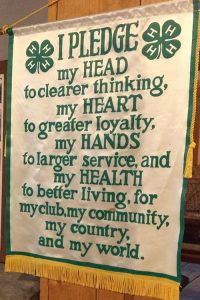Historical 4-H Exhibits at the Page Farm and Home Museum
 Take a virtual tour of 4-H exhibits in the Page Farm and Home Museum
Take a virtual tour of 4-H exhibits in the Page Farm and Home Museum
Visit the links below to view descriptions and photos of historical 4-H items on display in the Page Farm and Home Museum, University of Maine, Orono. Click on the images to view enlargements. All exhibit photos and text descriptions are by Ron Drum, Statewide 4-H Program Professional and Associate Director 4-H Resource Development (retired), University of Maine.
- 4-H Camp Vail
- State 4-H Championship Certificate
- The West Rockport 4-H Club 4-H Flag
- 4-H Club Charters
- National 4-H Camp/Conference and Andrew Watson
- 4-H Pledge
- National 4-H Congress and J. Alice Smith
- Thomas E. Wilson Day
- Maine State 4-H Song, 4-H Club Songs, and 4-H Club Cheers
- State 4-H Camp — 1936
What is 4-H?
Often called “your first UMaine course,” 4-H is the University of Maine’s premier youth development education program for young people ages 5 – 19. 4-H is a fun way to learn while acquiring the skills needed for adult life. Young people can join 4-H Clubs, experience 4-H in school, attend 4-H Camps, participate in 4-H Afterschool programs, and more! Conducted by University of Maine Cooperative Extension, the 4-H Program is active throughout Maine.
The University of Maine’s Department of Extension was established in 1907 as a way for the university to extend its classrooms into the community to bring the newest agricultural and home living methods achieved through academic research to the farmers and homemakers of Maine. However, many adults, resistant to breaking with tradition, were wary of trying these new ideas and methods. Young people, however, readily accepted the new ideas. Youth club work, introduced to Maine in 1913 as “Boys’ and Girls’ Agricultural Clubs,” soon saw youth exceeding their parents’ results which encouraged the parents to want to learn more.
The clubs’ original purpose of teaching agricultural methods, however, was soon eclipsed by the realization that 4-H programs were not only expanding the 4-H Member’s knowledge base through their project work, they were helping young people develop needed life skills, a process known today as “Positive Youth Development.”
Members of 4-H learn life skills primarily through their work on projects. The first three Maine 4-H projects were Canning and Gardening, Raising Potatoes, and Chick Raising or Poultry. Today 4-H’ers can explore almost any subject; just a few examples being Robotics, Dairy Science, Rocketry, Entomology, Computer Science, Geology, Fashion Design, Photography, Embryology, Knitting, Sheep, Sewing, Woodworking, Horses, Electricity, Small Pets, and even Gardening, Raising Potatoes, and Poultry.
As 4-H Members progress and achieve in 4-H, they participate in various county, state, and national 4-H events. These events provide learning sessions, sometimes involve competition, often offer socialization and networking opportunities, and generally broaden the young peoples’ perspective of themselves and their world. In many cases participation is an achievement award. Examples of Maine events held through the years include County Contests and Fairs, State 4-H Contest, State 4-H Camp/Teen Conference, 4-H@the University, 4-H Visual Presentation Day, and Maine 4-H Days. Regional event examples include 4-H Camp Vail, New England 4-H Teen Conference, and The Big E (Eastern States Exposition). National events include Citizenship Washington Focus (Citizenship Short Course prior to 1979), National 4-H Conference (National 4-H Club Camp prior to 1957), both held in Washington, D.C., and National 4-H Congress presently held in Atlanta; originally held in Chicago.
4-H Quotes of Note
“Belonging to 4-H was one of most important things, if not the most important, that I ever did.”
— Frederick Hutchinson, University of Maine President 1992-1997, Maine 4-H Alum
“If every kid in America were in 4-H, we’d have about half the problems we’ve got.”
— William J. Clinton, 42nd President of the United States
“Somebody was inspired when they thought of that!”
— Will Rogers, Entertainer, referring to the 4-H program
“I like 4-H’ers because they are dedicated to excellence.”
— Dwight David Eisenhower, 34th President of the United States upon the occasion of the ribbon cutting ceremony for the National 4-H Center, Chevy Chase, MD, 1959
“It is not hyperbole that I would not be doing what I’m doing today with the level of success at which I’m doing it if it weren’t for 4-H.”
— Jessica Nettles, Country Music Star, Georgia 4-H Alum
“4-H worked for me and I’ve continued to work for it.”
— Orville Redenbacher, American Businessman, Indiana 4-H Alum
“4-H has taught me that it’s totally okay to make mistakes when doing something new because that is how we learn the most from something.”
— Lydia Schofield, 11 year old Maine 4-H Member, 2016 recipient of a Western Writers Association Spur for her book, Buckaroo Bobby Sue
“I think 4-H really helped me to stretch myself to become more of a leader. I believe I am a stronger and more resilient person today because of my 4-H experiences. 4-H is a great opportunity for kids and teenagers to really get involved in something meaningful to them.”
— Betsy Carroll Anastasoff, Gorham High School Guidance Counselor, Maine 4-H Alum
“In every way possible, steps will be taken to organize Boys’ and Girls’ Agricultural Clubs.”
— Harold Shaw, Sagadahoc County Agricultural Extension Agent, 1915-16 Plan of Action
“The club work is one of the most important projects as it deals with the young people.”
— Evelyn Plummer, Oxford County 4-H Agent, 1927-28 Report on her activities during her first year
